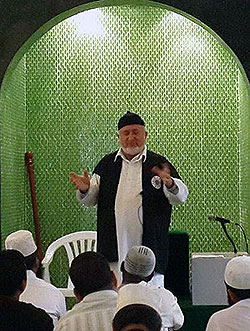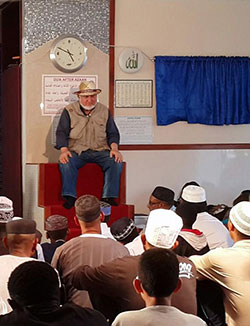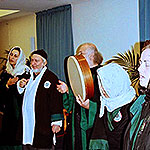Sohbet – Sermon of Divine Inspiration
In a holy hadith (tradition or saying of Prophet Muhammad), the Prophet (peace be upon him) said, “Acquiring knowledge in company for an hour in the night is better than spending the whole night in prayer.” Therefore, one of the most significant tools used by the shaykh in tasawwuf (the Sufi method) is sohbet, the discussion of spiritual matters. In this traditional Sufi practice, the shaykh sits in a circle with his murids (students) and proceeds to give an inspired talk on a pertinent spiritual subject. These words are direct teachings from Allah by way of Haqq-al-Yaqin (direct knowledge from Allah) operating in the heart of the shaykh. It may be that the message is coming via one of the members of the silsila (chain of spiritual ancestors) to the shaykh’s heart, yet it is understood that the form in which it is delivered does not diminish the fact that it is knowledge from Allah. One’s attentive presence at sohbet may be more important to the murid’s spiritual growth than any other tool of tasawwuf, with the exception of rabita (heart-connection with the shaykh).


During sohbet, the shaykh may teach a lesson by telling a story. Sufi storytelling is a tradition whereby the shaykh can elucidate a point in a subtle way, so that a student may be admonished, for example, without being embarrassed in front of his peers. It is crucial for Sufi shaykhs and followers of the path to make painstaking attempts to not break anyone’s heart, as this is Allah’s seat in the house of the human being. The shaykh knows when a heart can withstand a strong reproof, and when a more delicate handling of the matter is necessary. Sufi stories provide one means for such subtlety, while simultaneously opening an avenue for thoughtful reflection, for often the stories pose a conundrum that is not readily understood. In a similar way to a Zen koan, these tales can lead the contemplative student to deeper levels of understanding and enlightenment.
Please visit our page with zikr and sohbet audio and video samples.
On Sohbet
by Hz. Ahmed er RifaiAwliya (protecting friends; saints) are like bridges on the road to Haqq (Truth; Allah). People go towards Allah by passing over them. They are the owners of sincere, pure deeds and they are the people of purity and sincerity. Allah has saved them from the attachments of masiwa Allah (other than Allah) and has honored them with nearness to Him. There are no veils over their hearts. They abstain from revealing the divine secrets that they have been allowed to see. They are in constant contemplation and zikr (remembrance [of Allah]). “Rijaalullaa tulhiihim tijaaratun wa laa bay’un ‘an zikrillah ([Those] whom neither merchandise nor sale beguiles from remembrance of Allah)” (Qur'an 24:37) These are the people mentioned here.
I advise you that, after you learn the religious responsibilities, you should be in the sohbets of these exalted people. They possess the delight of truthfulness, the pleasure of loyalty, and yearning for the Mawla (Master; Allah). The likes of these qualities cannot be attained by studying lessons, but by being in the presence of the shaykh who possesses the knowledge of hal (state of being; situation; status) and the knowledge of qawl (utterances; words; wisdom). Awliya take and make use of wisdom wherever they find it; they are not particular about where it comes from. They do not discriminate as to who said it, even if an unbeliever narrated it, and thus they say, “yatafakkaruuna fi khalkissamaawaati wal ardi rabbana maa khalaqta hadha batilan (They contemplate the creation of the heavens and earth (and say) ‘You did not create these for nothing.’)” (3:191)
Make sure that the shaykh you want a connection with is kamil (mature). The nature or incomplete hal of the shaykh manifests, batin to batin (inner to inner), subliminally, in the murids (students; ones who long) or dervishes (Sufi initiates of a certain level). If the shaykh is mature, the murid will be mature and will advance and reach his destination. If the shaykh is incomplete or lacking, he causes the murid to be incomplete and not reach the goal. For that reason, you shaykhs, make sure that you do not transfer any incompleteness to those who connect with you.









